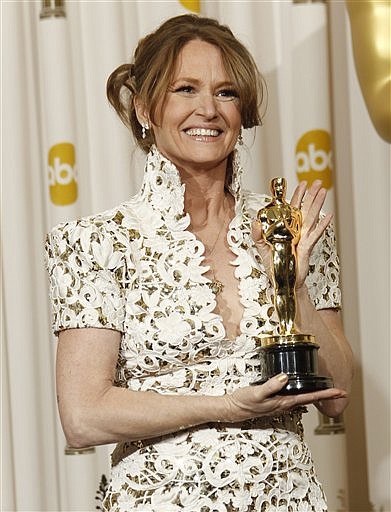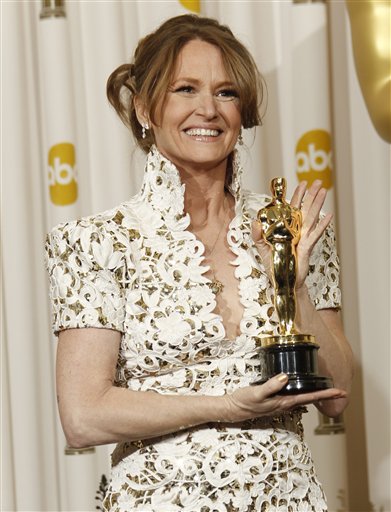LOS ANGELES (AP) - Melissa Leo won the supporting-actress Academy Award on Sunday for her role as the domineering matriarch of a boxing family in "The Fighter, while "Toy Story 3" claimed the prize for feature animation.
Network censors bleeped Leo for dropping the F-word during her speech. Backstage at the Kodak Theatre, Leo jokingly conceded it was "probably a very inappropriate place to use that particular word."
"Those words, I apologize to anyone that they offend. There is a great deal of the English language that is in my vernacular," Leo said.
But the Oscars, being a global affair, were telecast elsewhere in the world with Leo's words uncensored. Viewers who watched the show on Star Movies, a major channel available throughout Asia, heard the F-word loud and clear.
Leo's win capped an unusual career surge in middle age for the 50-year-old actress, who had moderate success on TV's "Homicide: Life on the Street" in her 30s but leaped to big-screen stardom in her late 40s, a time when most actresses find good roles hard to come by.
Some in Hollywood had speculated that Leo might have undermined her Oscar chances with self-promoting ads she ran in film trade papers. Such self-hype is considered tacky by some awards voters.
Whether it cost her votes or not, Leo still came out on top for "The Fighter," also a best-picture nominee.
"I'm just shaking in my boots here," Leo said. "Yeah, I am kind of speechless."
Still, Leo's speech went on for a couple of minutes, contrary to producers' pleas before the show to keep the talk tight.
Best-picture front-runner "The King's Speech," a tale of Britain's stammering King George VI that led contenders with 12 nominations, won only one of the first four prizes for which it was competing, best original screenplay for writer David Seidler.
The win capped a lifelong dream for Seidler, a boyhood stutterer born in London in 1937, a year after George took the throne. Seidler, who overcame his own stutter at age 16, had long vowed to one day write about the monarch whose fortitude set an example for him in childhood.
Seidler thanked Queen Elizabeth II, daughter of King George, "For not putting me in the Tower of London for using the Melissa Leo F-word." The film includes two scenes where the king spouts profanity in anger to help force out his syllables.
The Oscar for adapted screenplay went to Aaron Sorkin for "The Social Network," a chronicle of the birth of Facebook based on Ben Mezrich's book "The Accidental Billionaires."
While "The King's Speech" came in as the best-picture favorite, "The Social Network" was considered a potent prospect for an upset win.
The two films have led a strong and varied field of best-picture contenders since they debuted nearly six months ago. "The Social Network" was the early leader, grabbing key critics' honors and winning best drama at the Golden Globes. Momentum shifted to "The King's Speech" as the film dominated on Oscar nominations morning and swept top awards from influential actors, directors and producers guilds.
"Toy Story 3," last year's top-grossing release and a contender for best picture, won the fourth-straight animated-feature Oscar for Disney's Pixar Animation unit. Pixar has produced six of the 10 Oscar recipients for animation since the category was added, including "Finding Nemo," ''WALL-E" and last year's winner, "Up."
It was an odd backdrop for a Pixar win, the Oscar ceremony using visual effects to present the award in front of a re-creation of Far Far Away, the fairy-tale realm of Disney rival DreamWorks Animation's "Shrek" movies. The original "Shrek" won the first Oscar for feature animation, but unlike the durable "Toy Story" franchise, the "Shrek" series finished with a critical dud, last year's "Shrek Forever After."
Reuniting voice stars Tom Hanks and Tim Allen, "Toy Story 3" was the latest follow-up to the 1995 film that launched today's era of feature-length computer animation.
"Toy Story 3" director Lee Unkrich called Pixar the "most awesome place on the planet to make movies."
The Oscar for foreign-language film went to Danish filmmaker Susanne Bier's "In a Better World," a saga of two broken families that centers on two teenage boys struggling with violence at school and plotting revenge.
The Lewis Carroll update "Alice in Wonderland" won the first prize of the night, claiming the art direction Oscar over a field that included best-picture favorite "The King's Speech."
The show opened with co-hosts Anne Hathaway and James Franco inserted into a montage of scenes from best-picture nominees, built as a series of dream sequences reminiscent of Oscar contender "Inception." The footage included such guests as Morgan Freeman and last year's Oscar co-host Alec Baldwin.
Franco started off telling Hathaway how beautiful she looked. Hathaway shot back, "You look very appealing to a younger demographic, as well."
"Alice in Wonderland" production designer Robert Stromberg had warm words for the film's director, Tim Burton.
"Meet me with a saw, because half of this is yours," Stromberg told Burton, holding up his Oscar.
Also up for best picture: the psychosexual thriller "Black Swan"; the sci-fi blockbuster "Inception"; the lesbian-family tale "The Kids Are All Right"; the survival chronicle "127 Hours"; the Western "True Grit"; and the Ozarks crime story "Winter's Bone."
"Inception" took the night's second prize, for cinematography, leaving "The King's Speech" zero-for-three on its first nominations.
With TV ratings on a general decline over the last few decades, Oscar organizers doubled the best-picture category from five to 10 films last year, hoping to spice up the show and bring in a broader range of films. Academy overseers also have tried to liven up the show with fresh hosts, new routines and different ways of presenting awards.
It paid off last year, when the low-budget Iraq War drama "The Hurt Locker" beat sci-fi behemoth "Avatar" for best picture. TV viewers totaled 41.7 million, up 15 percent from the previous year and the biggest Oscar audience in five years.
This time, Oscar planners cast youthful hosts Hathaway and Franco (also a best-actor nominee for "127 Hours") and promised exotic visuals as backdrops to the ceremony. They also stepped up pressure for winners to keep speeches short and sharp, rather than intone long thank-you lists.
Early arrivals to the awards included supporting actress nominees Leo, Adams and Hailee Steinfeld, and best actress nominees Michelle Williams and Jennifer Lawrence.
Celebrity chef Wolfgang Puck, who is providing the grub for the post-awards show's Governor's Ball, also made a pass at the carpet, handing out some of the smoked salmon on flat bread he had prepared for appetizers. He also gave out chocolate Oscars.
Although it was bright and sunny over Los Angeles, it was very chilly with a cold wind blowing along the carpet. The stars didn't don jackets that would cover up their designer clothes, but many of the industry's behind-the-scenes people wore fur coats and wraps.
"I never expected this after 48 years of acting," said Jacki Weaver, a supporting-actress nominee for "Animal Kingdom." ''I can't believe it. I'm so thrilled. It's such an honor."
Kevin Spacey got a big reaction from fans once he removed his sunglasses.
"I love her, I adore her," he remarked about best actress nominee Annette Bening, his co-star in "American Beauty," which earned him an Oscar (Bening lost her Oscar bid for that film). "I was sorry not to see her take it home then. She's one of the great actresses we've ever produced."
Associated Press writers Beth Harris and Raquel Dillon contributed to this report.

